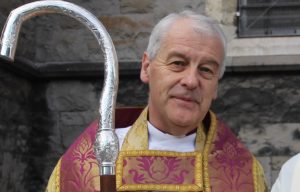
By Sarah Mac Donald - 09 October, 2019
 The Church of Ireland Archbishop of Dublin & Glendalough has expressed concern over the lack of clarity about Brexit, describing it as “still terrifyingly unclear” for both parts of the island of Ireland.
The Church of Ireland Archbishop of Dublin & Glendalough has expressed concern over the lack of clarity about Brexit, describing it as “still terrifyingly unclear” for both parts of the island of Ireland.
In his presidential address to the Dublin & Glendalough Diocesan Synod on Tuesday, Archbishop Michael Jackson was critical of the Brexit debate and discourse which he said, “had coarsened and hardened” as “populism and parliamentarianism were pitted against one another and conflated in charismatic, if less than attractive, personalities”.
He expressed solidarity with all those in many jurisdictions who will be affected by Brexit and particularly those in Ireland and in the Church of Ireland.
“Obsession around the backstop had effectively stopped people from asking what the frontstop was,” Dr Jackson highlighted.
“This is a European issue that cannot be ‘marketed’ as solely an Irish problem. People live and work on what is now changing from being a peaceable border to being a contested border. Peace in its day was courageous. Peace today remains a precious prize right across Ireland,” he stated.
He told the Synod’s delegates that it is not the Irish Backstop but the European Backstop and that peace in Northern Ireland was brought about through an international agreement.
“The people of the Border are people like myself with whom I have grown up, whom I greatly respect and with whom I subsequently ministered. They are fast becoming a pawn in a politics of cynical neglect and atrophy of understanding. They are our people too, however different they may sound,” he said.
Elsewhere in his address, Dr Jackson spoke about Anglican identity in Ireland today in light of the 150th anniversary of the Disestablishment of the Church of Ireland in 1869.
He told the Synod, “As members of the Church of Ireland, we have the unique opportunity to take a positive spirit forward in the year when we commemorate 150 years of Disestablishment.”
The Archbishop noted that one scholar had suggested that the reaction of the then new Church of Ireland (formerly the Church of England and Ireland) to Disestablishment in 1869 was to move firmly in the direction of introspective self-protection and withdrawal from the public square.
“While nobody dare refute such an analysis, and while we see ample and daily evidence of it, I would have to say that if we let such a mindset of decline and demoralization continue and deepen, it does not bode well either for our institutional survival or for our individual engaged citizenship in both the Republic of Ireland and in Northern Ireland. And it fails to do enough with our Gospel-inheritance,” Dr Jackson said.
Describing himself as “particularly proud” of the people and clergy of the diocese of Dublin and Glendalough as they “show we are ready to shape our future without need for fear in the 150th year of Disestablishment and beyond”, he acknowledged that there were many needs the diocese had to address.
“We have difficulties that are also opportunities. But one of our greatest difficulties and opportunities will be growth rather than decline – growth in numbers of people living in Dublin and growth in the urgency of our response to their being here among us as our neighbours. And that is hardly a difficulty!”